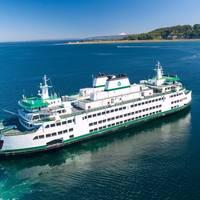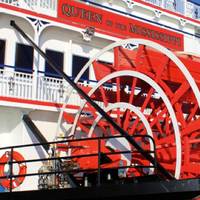Passenger Vessel Sector Faces Winding Path Back to ‘Normal’

The year just ended, 2021, might be described as being about “trying to get back to normal”, across the entire transportation spectrum, two years into the pandemic. During this time, the decarbonization and electrification waves have swept across maritime passenger transport. The passenger side of the business is dependent on multiple funding sources; increasingly, this money will be driven by environmental and social considerations.The long-awaited funding of “infrastructure”-related projects…
Barge Company Fined for Fertilizer Spill into Columbia, Snake Rivers
A local barge company has been fined $18,000 for spilling 40,000 gallons of liquid urea ammonium nitrate into the Snake and Columbia rivers. Urea ammonium nitrate is a common fertilizer that is corrosive to steel. An investigation by the Washington Department of Ecology found that two steel tank barges owned and operated by Tidewater Barge Lines, Inc. were not properly maintained, causing the liquid fertilizer to spill into the rivers during three separate incidents in April 2017. The first spill occurred between April 11 and 21 during transfer and storing operations at the Tidewater Snake River Terminal in Pasco. Investigators determined that 16,639 gallons of urea ammonium nitrate were released by Barge No. 78 due to corrosion of the storage tank.
ACL Designate Newbuilds for Mississippi & Columbia Rivers

American Cruise Lines (ACL) confirms it will be placing the first of 4 upcoming newbuilds on the Mississippi River, where it currently operates its newest riverboat, 'Queen of the Mississippi'. The second newbuild will operate in the Pacific Northwest on the Columbia and Snake Rivers, where the line is operating the 120-passenger 'Queen of the West'. The company adds that construction of both new riverboats is well underway at Chesapeake Shipbuilding in Salisbury, MD. The new Mississippi riverboat will have a similar capacity to Queen of the Mississippi at150 passengers…
ACL Newbuilds for Mississippi and Columbia Rivers
American Cruise Lines (ACL) today confirmed it will be placing the first of four upcoming newbuilds on the Mississippi River, where it currently operates its newest riverboat, Queen of the Mississippi. The second newbuild will operate in the Pacific Northwest on the Columbia and Snake Rivers, where the line is operating the 120-passenger Queen of the West. Construction of both new riverboats is well underway at Chesapeake Shipbuilding in Salisbury, Md. The new Mississippi riverboat will have a similar capacity to Queen of the Mississippi at 150 passengers, and will enter service in March of 2015. The new Columbia riverboat will follow later that same year. It will be slightly larger than American Cruise Lines’ other riverboats, with a planned capacity of 175 passengers.
CH-IV Prepares FEED for U.S. LNG Facility
The Oregon LNG Terminal will be located on the East Skipanon Peninsula near the confluence of the Skipanon and the Columbia Rivers in Warrenton, Clatsop County, Oregon. Jeffrey P. CH-IV International had previously prepared a FEED for Oregon LNG for its proposed LNG Import Terminal, which has now been modified to include liquefaction facilities. Mr. Beale stated, “CH-IV is excited to continue working with the Oregon LNG Team on such an important project. CH-IV International is a joint venture corporation between MPR Associates, Inc. and CH-IV Cryogenics, LP.
History: Amerian Origins: Lewis & Clark's Expedition and its Effects on Modern Navigation
By Debra Colbert, Waterways Work! In our fast-paced, contemporary world, it is sometimes hard to recall the historical origins of modern-day advances we take for granted. A good example is this country's inland waterways navigation system which allows for the transport of key commodities such as coal, grain, chemicals, and petroleum. And while our national waterways system today is a critical, integral component of the manufacturing, distribution and industrial economy of the United States and its ability to compete in world markets, its origin stems from a small river expedition of two young explorers, Meriwether Lewis and William Clark.







